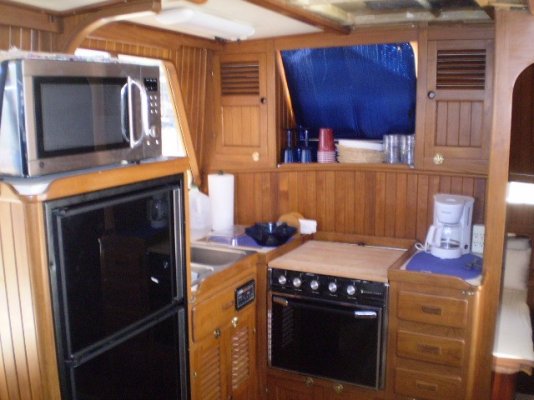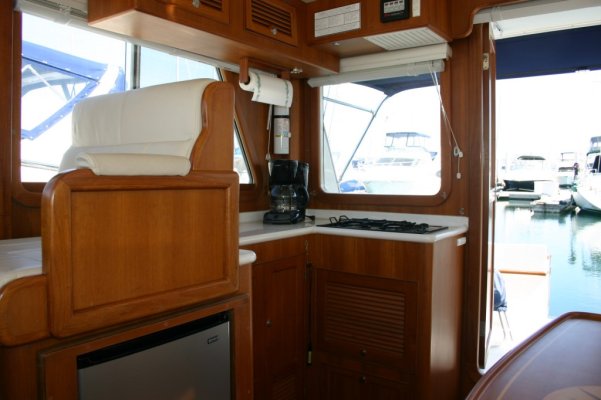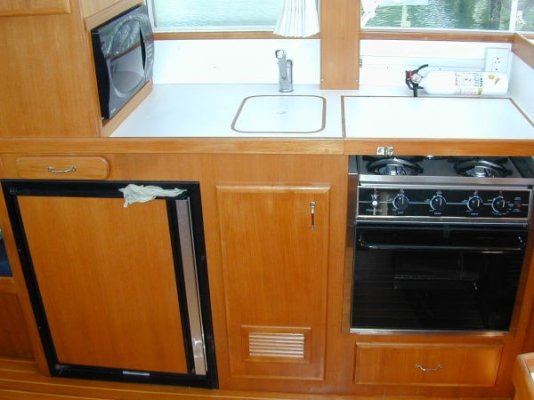Woodsong wrote:
Are most of you all running propane stoves on your trawlers?
*
Just about all GBs have propane ranges (stove & oven unit).* Our '73 had a Magic Chef four burner range when we bought the boat.* From its color and style it was probably original to the boat.*
The propane supply used by the previous owner was a BBQ bottle with bolted on feet on its side in the propane locker on the flying bridge.* We subsequently found out this is a very bad idea as BBQ bottles are not made to operate on their sides and the feed can be quite uneven.
Within the first week of having the boat we found the burner valve for the oven was leaking and the others were iffy.* So within two weeks of buying the boat we had the old Magic Chef removed and a new Force 10 installed. The Force 10 has been trouble-free for the last 12 years and my wife much prefers cooking on it to our electric range at home.
At the same time we installed the Force 10 we replaced the converted BBQ bottle in the propane locker with a purpose-built horizontal aluminum tank (not cheap), and a couple of years later added a second identical tank beside it.* While new horizontal tanks are made with an OPD, it is still legal to refill older horzontal tanks that have no OPD.* We have one old and one new tank along with a copy of the waiver in case a propane dealer questions our old tank.* No one ever has, however.
We would not want an electric range on any boat we might have because of the need to provide power to it (generator) and the fact that my wife much prefers cooking with gas/propane to electricity.* The narrowboats we have hired on the British canals since 1990 all have propane stoves, propane water heaters, and some have had propane refrigerators, which we much prefer over electric refrigerators.* We have never had a problem with any of these systems.
A propane system that is properly set up with good components installed correctly is no more dangerous than any other system on a boat.* Propane can blow your boat up, electricity can burn your boat down, and you can run your boat into a rock.* All it takes to prevent all three is common sense and an operational process than ensures safety.
We turn off the propane bottle that is connected to the feed line whenver we leave the boat for a period of time or when it's back in its slip.* We turn off the manual shutoff valve in the feed line up in the propane locker that is operated by a handle in the galley overhead whenver the range is not actually being used to cook or heat something.* Shutting off the propane system from the bottle to the range is on our "before leaving the boat" checklist we go through every time we leave the boat, either during a cruise or at the end of one.* So we have no qualms whatsoever about the propane system on our boat at all.
Speaking of Force 10 stoves/ranges, we made a simple addition to ours which makes it safer and protects the controls.* The photo pretty much says it all.* The position of the range on all but the very first GB36s is such that you brush past it every time you enter or leave the forward cabin.* Also if someone comes up to stand beside the helmsman to help watch for debris in the water or whatever, they invariably end up standing between the helm console and the stove.* The controls are about butt height so it was not uncommon for a person to inadvertantly turn on a burner valve or even pop a knob off the faceplate.
We solved this with the installation of a stainless steel drawer pull.* It acts as a guard above the burner knobs and since installing it years ago we've not had a burner accidentally turned on or a knob bumped off.* Since we always shut off the feed valve to the range when we're not atually using it a knob being bumped on was not an immediate safety issue but it was still something we didn't like to have happen.
A terrific featue of the Force 10 with regards to our boat is the "disappearing" oven door.* A traditional oven door would take up just about all the space beween the range and the helm consol opposite it.* The disappearing door means the space in front of the oven remains clear when someone goes to put something in or take something out of the oven.* Very smart design.






